This article was co-authored by wikiHow staff writer, Amy Bobinger. Amy Bobinger has been a writer and editor at wikiHow since 2017. She especially enjoys writing articles that help people overcome interpersonal hurdles but frequently covers a variety of subjects, including health and wellness, spirituality, gardening, and more. Amy graduated with a B.A. in English Lit from Mississippi College in 2011 and now lives in her hometown with her husband and two young sons.
There are 13 references cited in this article, which can be found at the bottom of the page.
This article has been viewed 30,254 times.
Learn more...
If you're planning to have a hysterectomy, you may have a lot of questions about what your sex life will be like afterward. It's true that you might notice some changes after the surgery, but that doesn't mean sex is off the table. In fact, some women even get more enjoyment from sex once they're no longer struggling with the health issues that led to their hysterectomy! Keep reading to learn more about what to expect after surgery.
Steps
How can I make sex more comfortable after I have a hysterectomy?
-
1Over-the-counter lubricants and hormone replacement are helpful for dryness. Some women have trouble with vaginal dryness after a hysterectomy. Sexual lubricants are very helpful with this—try experimenting with different brands to find one you like. You might even find that this adds a fun new element to your sex life![7]
- Your doctor might also recommend hormone replacement therapy, like the use of an estrogen cream—especially if your libido was affected after the surgery. This is more common if your ovaries were removed during the procedure.[8]
- If you find that vaginal tightness is an issue, talk to your doctor about using a vaginal dilator kit to make sex easier. These kits include plastic tubes in various sizes—you start by inserting the smallest dilator, then gradually working up to the larger ones as you feel comfortable.[9]
-
2Do pelvic floor exercises to help improve sensation during sex. During your recovery, your doctor or physical therapist will advise you when to start doing pelvic floor exercises to help restore strength to the area. Pelvic floor strength is important for things like bladder control, but it will also help you experience more sensation during penetration.[10]
- For instance, your doctor may recommend that starting a few weeks after your surgery, you should squeeze the muscles in your pelvic area (like if you're trying to stop urinating mid-stream) for several seconds at a time.
References
- ↑ https://www.rcog.org.uk/en/patients/patient-leaflets/abdominal-hysterectomy/
- ↑ https://www.mskcc.org/cancer-care/patient-education/about-your-robotic-assisted-laparoscopic-hysterectomy
- ↑ https://lluh.org/services/minimally-invasive-robotic-surgery/patients-families/what-expect-after-gynecologic-robotic-surgery
- ↑ https://www.healthywomen.org/content/ask-expert/1357/hysterectomy-and-lack-orgasm
- ↑ https://www.nhs.uk/live-well/sexual-health/sex-after-hysterectomy/
- ↑ https://www.mskcc.org/cancer-care/patient-education/about-your-robotic-assisted-laparoscopic-hysterectomy
- ↑ https://www.nhs.uk/conditions/vaginal-dryness/
- ↑ https://lluh.org/services/minimally-invasive-robotic-surgery/patients-families/what-expect-after-gynecologic-robotic-surgery
- ↑ https://www.mskcc.org/cancer-care/patient-education/how-use-vaginal-dilator
- ↑ https://www.betterhealth.vic.gov.au/health/conditionsandtreatments/hysterectomy
- ↑ https://www.nhs.uk/live-well/sexual-health/sex-after-hysterectomy/
- ↑ https://my.clevelandclinic.org/health/treatments/15245-hormone-therapy-for-menopause-symptoms
- ↑ https://www.nhs.uk/live-well/sexual-health/sex-after-hysterectomy/
- ↑ https://my.clevelandclinic.org/health/treatments/4852-hysterectomy
- ↑ https://www.nhs.uk/conditions/hysterectomy/recovery/
- ↑ https://www.betterhealth.vic.gov.au/health/conditionsandtreatments/hysterectomy









-Step-10.webp)
-Step-20.webp)



















-Step-10.webp)
-Step-20.webp)



































Medical Disclaimer
The content of this article is not intended to be a substitute for professional medical advice, examination, diagnosis, or treatment. You should always contact your doctor or other qualified healthcare professional before starting, changing, or stopping any kind of health treatment.
Read More...